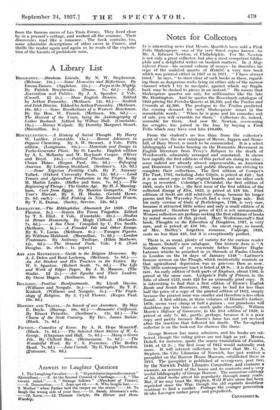Notes for Collectors
Fr is interesting news that Messrs. Quaritch have sold a First Folio Shakespeare-one of the very finest copies known-to Mr. A. Edward Newton, of Philadelphia. For Mr. Newton is not only a great collector, but also a most competent biblio- phile and a delightful writer on bookish matters. In A Mag- nificent Farce-his second volume of essays-he describes his copy of the undated quarto of Hamlet, a very rare book which was printed either in 1607 or in 1611. " I have al ways tried," he says, " to steer clear of such books as these, regard- ing them as dangerous rocks lying on either side of the narrow channel which I try to navigate, against which my fragile bark may be dashed to pieces in an instant." He means that Shakespeare quartos are only for millionaires like the late Mr. Huntington. And he quotes the Rosenbach catalogue of 1920 pricing the Pericles Quarto at £6,500, and the Troilus and Cressida at £2,500. The prologue to the Troilus predicted the coming demand for early Shakespeare issues in the remarkable words : " When he is gone and his comedies out of sale, you will scramble for them." Collectors do, indeed, scramble for them. And now Mr. Newton, overcoming his scruples, has joined in the fray by buying a First Folio which may have cost him £10,000.
From the student's no less than from the collector's point of view, the new catalogue of Messrs. Ingpen and Stone- hill, of Bury Street, is much to be commended. It is a select bibliography of books bearing on the Romantic Movement in English literature from Percy's Reliques to the death of Wordsworth, admirably arranged and annotated. It shows how rapidly the first editions of this period are rising in value ; some indeed are already almost unprocurable, as American and Dominion University and public libraries are striving to complete their collections. The first edition of Cowper's The Task, 1785, including John Gilpin, is priced at £20 ; but it is an uncut copy in the original boards, and no other such copy is recorded. Coleridge's Christabel, the first edition of 1816, costs £15 15s. ' - the first issue of the first edition of the collected Essays of Elia, 1823, is priced at £10 10s. First editions of Scott are still relatively cheap, because his longer poems and the Waverley Novels had a very large sale. But his early version of Goetz of Berlichingen, 1799, is very rare, because it attracted little notice and only a small edition of it was printed ; therefore the price of £15 is nA unreasonable. Women collectors are perhaps seeking the first editions of books by noted women of this period. Mary Wollstonecraft's first book, Thoughts on the Education of Daughters, 1787, is very rare, and is priced at £10 10s. An uncut copy, as issued, of Mrs. Shelley's forgotten romance, Valperga, 1823, costs no less than £45, but it is exceptionally perfect.
There is, as usual, plenty of variety for the curious reader in Messrs. Dobell's new catalogue. One historic item is " A Notable Sermon of ye reuerende father Maister Hughe Latemer whiche he preached in ye Shrouds at Paules Church in London on the 18 daye of January 1548 "-Latimer's famous sermon on the Plough, which incidentally reminds us that agricultural depression was as grievous then as now. The little contemporary tract is listed at £9 9s. ; it is distinctly rare. An early edition of both parts of Euphues, about 1592, is priced at the same sum. Lydgate's Falls of Princes, in the folio of about 1555, costs £25 for an unusually good copy. It is interesting to find that a first edition of Byron's English Bards and Scotch Reviewers, 1805, may be had for less than half the price of a copy of the pirated edition of 1812, simply because the pirated issue was smaller and therefore is less often found. A first edition, in three volumes, of Disraeli's Lothair, 1870, seems very cheap at half a guinea ; our grandsons will doubtless pay ten times as much quite cheerfully. William Morris's Defence of Guenevere, in the first edition of 1858, is priced at only 7s. 6d., partly, perhaps, because it is a poor copy and partly because Morris's fame has not yet revived after the reaction that followed his death. The far-sighted collector is on the look-out for chances like these.
George Borrow has many admirers, and his books are col- lected, though the ruling prices are not high as yet. Messrs. Dobell, for instance, quote the scarce translation of Faustus, 1840, at £2 2s. ; the first issue of 1825 would naturally cosh more. It will interest collectors to know that Mr. G. A. Stephen, the City Librarian of Norwich, hasjust written a pamphlet on the Borrow House Museum, established there in 1913. The pamphlet is published at severipswe, post free, by the Norwich Public Libraries Committee, and contains a memoir, an account of the house and its contents, and a very useful bibliography of George Borrow. The numerous editioo of his chief works attest his popularity through many years. But, if we may trust Mr. Stephen, Wild Wales alone has been reprinted since the War, though the old reprints doubtless continue to find a market. Perhaps the younger generatioU th'nks Lavengro rather prosy and prejudiced.
CON240188E1.711.










































 Previous page
Previous page